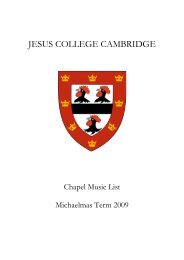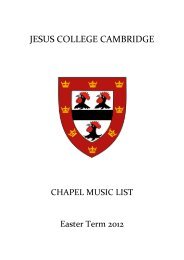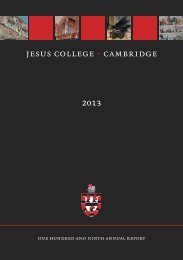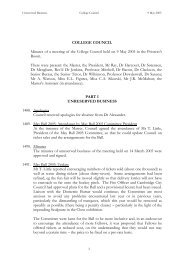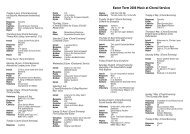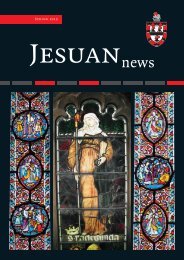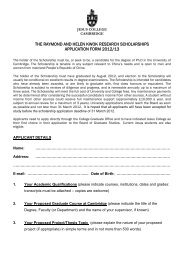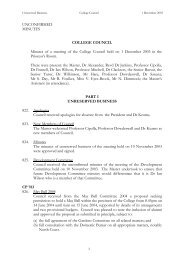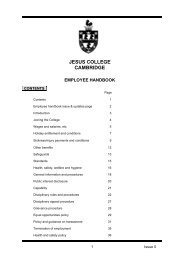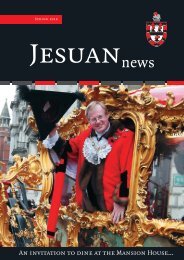2012 Annual Report - Jesus College - University of Cambridge
2012 Annual Report - Jesus College - University of Cambridge
2012 Annual Report - Jesus College - University of Cambridge
Create successful ePaper yourself
Turn your PDF publications into a flip-book with our unique Google optimized e-Paper software.
50 CREATOR OF THE MODERN COLLEGE I <strong>Jesus</strong> <strong>College</strong> <strong>Annual</strong> <strong>Report</strong> <strong>2012</strong><br />
– it was their first experience <strong>of</strong> formal<br />
education – and from there, Henry, aged 16,<br />
went to King’s <strong>College</strong> London, as stoutly<br />
defended a bastion <strong>of</strong> Anglicanism as any<br />
Oxbridge college. Its poorly regarded medical<br />
school apart, it then functioned, essentially,<br />
as a VIth Form college, with a scholarship<br />
class for those intending to go on to<br />
<strong>Cambridge</strong> or Oxford to get a degree and seek<br />
ordination. (The other students went, degreeless,<br />
straight into commerce, the pr<strong>of</strong>essions<br />
or the civil service.) The scholarship class was<br />
notably successful: in the year that Morgan<br />
took the Mathematical Tripos (1853) 13 out<br />
<strong>of</strong> the 41 Wranglers (the First Class) had<br />
come to <strong>Cambridge</strong> via KCL (he was the 26th<br />
Wrangler), as had the top six Senior Optimes<br />
(the Seconds), all <strong>of</strong> them having earlier<br />
obtained the best <strong>of</strong> their colleges’<br />
scholarships. 5 Among the KCL<br />
contemporaries who came with Morgan to<br />
<strong>Cambridge</strong> was his life-long friend Leslie<br />
Stephen, the noted Alpinist, father <strong>of</strong> Virginia<br />
Woolf and founding editor <strong>of</strong> the Dictionary <strong>of</strong><br />
National Biography, who (until he lost his<br />
faith, resigning his Orders and his<br />
fellowship) was to be as charismatic a Tutor<br />
at Trinity Hall as Morgan was at <strong>Jesus</strong>.<br />
Arriving in the Michaelmas term 1849, the<br />
last <strong>of</strong> the graceful and respected Dr French’s<br />
mastership, he found the <strong>College</strong> more or<br />
less full, with 55 students, a third <strong>of</strong> them,<br />
like him, clergymen’s sons, attracted by the<br />
Rustat and related scholarships. The<br />
restoration <strong>of</strong> the inner Chapel, guided by<br />
Pugin, was receiving much admiring interest.<br />
In the last hundred or so years most<br />
<strong>Cambridge</strong> (and Oxford) colleges have, as a<br />
result <strong>of</strong> the reforms made by the <strong>University</strong><br />
Commissions established under the Oxford<br />
and <strong>Cambridge</strong> Universities Acts <strong>of</strong> 1877 and<br />
1923, been much <strong>of</strong> a muchness. Each has,<br />
<strong>of</strong> course, its own atmosphere and traditions,<br />
and there are some variations (though less<br />
than <strong>of</strong>ten thought) in academic reputation,<br />
sporting prowess, and amenities. But, at<br />
bottom, they all have similar academic aims<br />
and policies; the same criteria – <strong>of</strong> open<br />
competition on merit – are applied to the<br />
admissions <strong>of</strong> students and elections to<br />
fellowships; and in these smaller<br />
communities they <strong>of</strong>fer their members<br />
comparable benefits within the larger<br />
<strong>University</strong>. And the <strong>University</strong> not only<br />
examines, but provides most <strong>of</strong> the teaching<br />
and nearly all the facilities needed for<br />
advanced study and research. One hundred<br />
and sixty years ago, when Morgan came up, it<br />
was all hugely different.<br />
The <strong>University</strong> was then little more than an<br />
examining and a police authority linking its<br />
17 <strong>College</strong>s. It had only just acquired an art<br />
gallery and museum, and its library was<br />
struggling to cope with the increased flow <strong>of</strong><br />
printed books. Almost all the teaching was<br />
done (at a lowly level) in the colleges or (to a<br />
higher standard) by private tutors, “coaches”,<br />
and the variations between colleges – where<br />
their students came from (regionally and<br />
socially) and the reasons which brought them<br />
to <strong>Cambridge</strong> (not always to get a degree);<br />
what scholarships and what other help they<br />
<strong>of</strong>fered them; their fees, charges and room<br />
rents; and from whom and by what means<br />
they selected their fellows (all <strong>of</strong> whom had,<br />
however, to be Anglicans) – were enormous.<br />
Some colleges, notably Trinity and<br />
Emmanuel, chose their fellows by<br />
examination, some only from among their<br />
own scholars, some on the basis <strong>of</strong> Tripos<br />
performance and general reputation, some<br />
regularly, others when there were casual<br />
vacancies to be filled; and the length and<br />
condition <strong>of</strong> tenure varied too. Only a small<br />
minority <strong>of</strong> the fellows were involved in<br />
teaching, and fewer still in advanced study<br />
and research, or were even resident. For the<br />
non-resident, a fellowship was little more<br />
than an annuity payable from a college’s<br />
surplus income. And colleges varied vastly in<br />
size and financial resources. More than half<br />
<strong>of</strong> all the students in <strong>Cambridge</strong> belonged to<br />
just two: Trinity and St John’s, which, with<br />
comparably large bodies <strong>of</strong> resident fellows,<br />
called most <strong>of</strong> the <strong>University</strong>’s tunes.<br />
<strong>Jesus</strong> if, in its own terms, prospering in<br />
1849, was nonetheless one <strong>of</strong> the smaller and<br />
poorer colleges: in both 1850 and 1851 there<br />
would be deficits. So its sixteen fellowships<br />
were not worth much (and in some years<br />
nothing beyond free board and lodging).<br />
They were, in theory, open to all (male)<br />
British subjects who were members <strong>of</strong> the<br />
United Church <strong>of</strong> England and Ireland and



